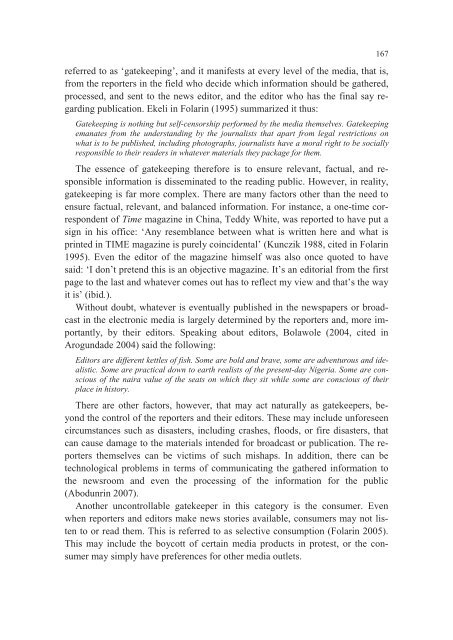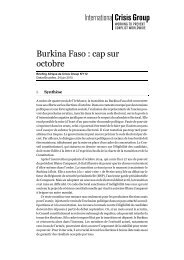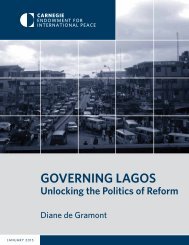Violence in Nigeria
ASC-075287668-3743-01
ASC-075287668-3743-01
You also want an ePaper? Increase the reach of your titles
YUMPU automatically turns print PDFs into web optimized ePapers that Google loves.
eferred to as ‘gatekeep<strong>in</strong>g’, and it manifests at every level of the media, that is,<br />
from the reporters <strong>in</strong> the field who decide which <strong>in</strong>formation should be gathered,<br />
processed, and sent to the news editor, and the editor who has the f<strong>in</strong>al say regard<strong>in</strong>g<br />
publication. Ekeli <strong>in</strong> Folar<strong>in</strong> (1995) summarized it thus:<br />
Gatekeep<strong>in</strong>g is noth<strong>in</strong>g but self-censorship performed by the media themselves. Gatekeep<strong>in</strong>g<br />
emanates from the understand<strong>in</strong>g by the journalists that apart from legal restrictions on<br />
what is to be published, <strong>in</strong>clud<strong>in</strong>g photographs, journalists have a moral right to be socially<br />
responsible to their readers <strong>in</strong> whatever materials they package for them.<br />
The essence of gatekeep<strong>in</strong>g therefore is to ensure relevant, factual, and responsible<br />
<strong>in</strong>formation is dissem<strong>in</strong>ated to the read<strong>in</strong>g public. However, <strong>in</strong> reality,<br />
gatekeep<strong>in</strong>g is far more complex. There are many factors other than the need to<br />
ensure factual, relevant, and balanced <strong>in</strong>formation. For <strong>in</strong>stance, a one-time correspondent<br />
of Time magaz<strong>in</strong>e <strong>in</strong> Ch<strong>in</strong>a, Teddy White, was reported to have put a<br />
sign <strong>in</strong> his office: ‘Any resemblance between what is written here and what is<br />
pr<strong>in</strong>ted <strong>in</strong> TIME magaz<strong>in</strong>e is purely co<strong>in</strong>cidental’ (Kunczik 1988, cited <strong>in</strong> Folar<strong>in</strong><br />
1995). Even the editor of the magaz<strong>in</strong>e himself was also once quoted to have<br />
said: ‘I don’t pretend this is an objective magaz<strong>in</strong>e. It’s an editorial from the first<br />
page to the last and whatever comes out has to reflect my view and that’s the way<br />
it is’ (ibid.).<br />
Without doubt, whatever is eventually published <strong>in</strong> the newspapers or broadcast<br />
<strong>in</strong> the electronic media is largely determ<strong>in</strong>ed by the reporters and, more importantly,<br />
by their editors. Speak<strong>in</strong>g about editors, Bolawole (2004, cited <strong>in</strong><br />
Arogundade 2004) said the follow<strong>in</strong>g:<br />
Editors are different kettles of fish. Some are bold and brave, some are adventurous and idealistic.<br />
Some are practical down to earth realists of the present-day <strong>Nigeria</strong>. Some are conscious<br />
of the naira value of the seats on which they sit while some are conscious of their<br />
place <strong>in</strong> history.<br />
There are other factors, however, that may act naturally as gatekeepers, beyond<br />
the control of the reporters and their editors. These may <strong>in</strong>clude unforeseen<br />
circumstances such as disasters, <strong>in</strong>clud<strong>in</strong>g crashes, floods, or fire disasters, that<br />
can cause damage to the materials <strong>in</strong>tended for broadcast or publication. The reporters<br />
themselves can be victims of such mishaps. In addition, there can be<br />
technological problems <strong>in</strong> terms of communicat<strong>in</strong>g the gathered <strong>in</strong>formation to<br />
the newsroom and even the process<strong>in</strong>g of the <strong>in</strong>formation for the public<br />
(Abodunr<strong>in</strong> 2007).<br />
Another uncontrollable gatekeeper <strong>in</strong> this category is the consumer. Even<br />
when reporters and editors make news stories available, consumers may not listen<br />
to or read them. This is referred to as selective consumption (Folar<strong>in</strong> 2005).<br />
This may <strong>in</strong>clude the boycott of certa<strong>in</strong> media products <strong>in</strong> protest, or the consumer<br />
may simply have preferences for other media outlets.<br />
167






